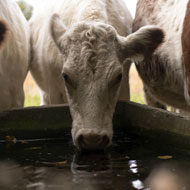Defra confirms commitment to tackling AMR post-Brexit

“The UK is a world leader in tackling antimicrobial resistance and our approach will not change when we have left the EU."
Defra has denied claims that the UK is planning to avoid upcoming EU legislation to cut antibiotic use on farms.
Planned EU regulations, due to come into force after Brexit, will ban the use of prophylactic antibiotics in feed and drinking water for groups of animals.
However, the Alliance to Save Our Antibiotics recently claimed that the Veterinary Medicine’s Directorate (VMD) would allow this practice to continue. The group says the comments were made by VMD’s director of operations, Paul Green, during a stakeholder meeting in July.
Responding in a blog post, Defra said the comments, published by the Guardian, were “untrue” and “based purely on hearsay”.
The statement continued: “The UK played a key role in the drafting of new EU regulations to cut use of antibiotics on farms and fully support this new legislation. We cannot commit to adopting these in the UK because they do not come into force until we have left the EU.
“We are therefore not constrained by this legislation and with negotiations still ongoing, but we could even go further than this EU legislation if that is what we see fit.
“The UK is a world leader in tackling antimicrobial resistance and our approach will not change when we have left the EU. We will use Brexit as an opportunity to enhance animal welfare wherever possible.”
A government spokesperson added: “Leaving the EU will not change our commitment to tackle antibiotic resistance and the UK will remain a world leader in helping preserve these medicines for future generations.”



 The latest
The latest